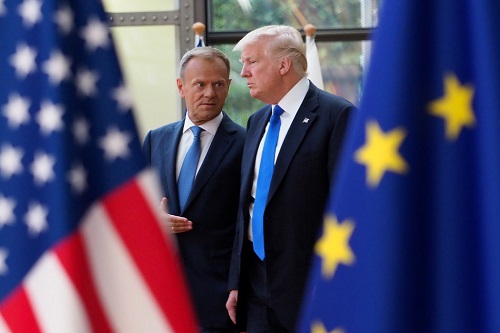EC photo
By
Tom Arms
Donald Tusk, President of the European Council, was ironically sanguine about Donald Trump’s withdrawal from the Iran Nuclear Deal.
“Frankly speaking,” he said, “Europe should be grateful to President Trump. Thanks to him we have got rid of old illusions. He has made us realise that if you need a helping hand, you will find one at the end of your arm.”
Tusk was addressing a gathering of EU leaders before they trooped off to dinner. He was using the occasion to urge Europe’s leaders to stand up to Trump and protect the Iran Nuclear Deal and the political and economic benefits that stemmed from it.
“I have no doubt, said Mr Tusk, “that in the new global game, Europe will either be one of the major players, or a pawn. This is the only real alternative. In order to be the subject and not the object of global politics, Europe must be united economically, politically and also militarily like never before. To put it simply: either we are together, or we will not be at all.”
Unfortunately the signs of a stiffening European backbone are yet to appear. Two of the biggest deals affected by American withdrawal from the 2015 Iran Nuclear Accord were a $5 billion oil deal involving the French oil company Total and the National Iranian Oil Company and a $20 billion contract involving the sale of 100 Airbus planes to Iranian air carrier Aseman Airlines.
Total last week announced it is pulling out of its contract and Airbus is desperately trying to organise early delivery before the sanctions are officially imposed in just under 90 days.
The problem is that Trump’s withdrawal from the Accord was accompanied with the re-imposition of economic sanctions, including secondary sanctions. This means that anyone who wants to deal with America cannot sell its goods and services to Iran. As the American market is many times bigger than the Iranian, the decision is pretty much a no-brainer.
The Chinese, however, think they can take on the Americans. CNPC- the China National Petroleum Company – is positioned to take on the development and production of South Pars, the world’s largest gas field, which was going to be exploited by Total.
Over the weekend, German Economy Minister Peter Altmaier said his country viewed President Donald Trump’s unilateral withdrawal from the nuclear pact with Iran as wrong, adding that Berlin hopes Washington can still be persuaded not to punish foreign firms doing business there.
Mr Maas said, however, that it could be difficult to protect European firms from any fallout from the US decision.
“I do not see a simple solution to shield companies from all risks of American sanctions,” Maas told the ‘Bild am Sonntag’ newspaper.
Altmaier said there was a deadline of up to 90 days for foreign firms to comply with US sanctions or face penalties. “In this time, we’ll use all possibilities to persuade the US government to change its behaviour,” he told ZDF television.
Tom Arms
I am a journalist, entrepreneur and historian with extensive experience in print, web and broadcast journalism. I started as a diplomatic correspondent, wrote several books (The Falklands Crisis, World Elections On File and the Encyclopedia of the Cold War), and then in 1987 started my own business (Future Events News Service, www.fensinformation.com) which over 25 years established itself as the world and UK media’s diary. Our strapline was: “We set the world’s news agenda.” I sold FENS in December 2012 but retained the exclusive broadcast rights to all of FENS data. To exploit these rights I set up LookAhead TV which produces unique programmes which “Broadcasts Tomorrow Today” so that viewers can “Plan to Participate.” LookAhead has appeared regularly on Vox Africa, Radio Tatras International, The Conversation and Voice of Africa Radio.
In addition to being a syndicated broadcaster and columnist on global affairs, Tom is also available for speaking engagements and can be contacted on Twitter, Linkedin and email: [email protected].



No Comments Yet!
You can be first to comment this post!